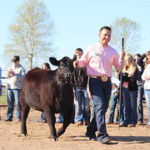Three Colorado State University students were recently recognized by the United States Department of Agriculture (USDA), National Institute of Food and Agriculture (NIFA), Agriculture and Food Research Initiative (AFRI) Predoctoral Fellowship Program, a leader as one of the largest federal funding agencies propelling cutting-edge discoveries that impact people’s daily lives and the nation’s future.
The esteemed program is most prominently known for investing in initiatives that ensure the long-term viability of agriculture, through the recognition and support of high-performing doctoral candidates, providing funding and strategic leadership amidst programs that ensure groundbreaking discoveries in agriculture-related sciences and technologies.
CSU students who received fellowships in 2023 include Nico Menjivar, Jessica Kincade, and Kyle Fresa.
The three-year fellowship includes a maximum amount of $180,000, restricted to $60,000 per year, including an annual stipend of $35,000, $22,000 for tuition, fees, fringe, supplies, workshops, travel, and publications, and up to $3,000 cost of education allowance.
Notably, at the inception of their programs, Nico Menjivar and Jessica Kincade initially received funding as National Needs Graduate Fellowships (NNF), specifically intended to support traineeship programs that engage outstanding students to pursue and complete their degrees in USDA mission areas in which Dr. Dawit Tesfaye serves as the Principal Investigator (2021-38420-34040).
NNF Graduate Fellowship Program (Interview with Dr. Dawit Tesfaye)
What does it mean to have students receive USDA-NIFA-AFRI Predoctoral funding post-enrollment under your NNF training program?
As a means of facilitating the mission of the Animal Reproduction and Biotechnology Laboratory and moreover the Department of Biomedical Sciences, the USDA-NIFA National Needs Fellowship training grant is primarily geared to contribute to the training of the next generation of animal scientists needed for the U.S. animal agriculture industry. Students admitted to the program are subjected to a multidisciplinary graduate education, in part mentored by faculty members from three Departments across Colorado State University: Biomedical Sciences, Clinical Sciences, and Animal Sciences. Additionally, fellows within this program are eventually encouraged to apply for USDA-NIFA-AFRI Predoctoral Fellowships, bolstering a unique opportunity for them to become well acquainted with grant writing skills, essential for their future academic careers. In this regard, these students’ successful acquisition of fellowships is a true testament to their hard work, of course with notable CSU faculty members playing a pivotal role in their growth as individuals.
How does this affect their future plans? How does this reflect their work ethic?
Students admitted in the NNF program experience graduate-level training through experiential learning, hands-on research, extension, teaching, as well as through various other activities crucial for their professional development. Moreover, they are provided with professional counseling from the Department’s Graduate Education Coordinator and are also given the opportunity to complete international research travel experiences for training and collaboration, as well as networking with scientific leaders in their field. Collectively, students initially enrolled in the NNF program are provided with integrated graduate-level training, to ultimately acquire the necessary knowledge and skills to make them the most competitive candidates in the job market entering their careers.
What does graduate-level funding mean for your Department and/or Program?
The USDA-NIFA NNF training grant has been one of the means to support the vision of the Animal Reproduction and Biotechnology Laboratory, to foster advancements in the reproductive health of animals and humans through integrative research and training. Moreover, such funding opportunities create a unique approach to providing a high-quality education through collaborative, state-of-the-art approaches and through basic research that has the potential to greatly influence the health and welfare of animals with translational application to clinical human reproductive health. Ultimately, the efforts and success of our students to effectively contribute to obtaining federal funding only enhances the credibility of our growing program.
USDA-NIFA-AFRI Predoctoral Fellows

Nico Menjivar is a Ph.D. Candidate in the Department of Biomedical Sciences at the Animal Reproduction and Biotechnology Laboratory. Menjivar’s current research focus involves investigating the role of extracellular vesicle (EV)-mediated molecular signaling during oocyte and preimplantation embryo development and furthermore deciphering their molecular cargoes to engineer EVs for potential downstream application in assisted reproductive technology procedures. Menjivar plans to pursue a career in close-knit to academia at a research institution focusing on translational advancements in reproductive biology with profound impacts on humans and animals.

Jessica Kincade is a graduate student in the Department of Biomedical Sciences under the dual supervision of Dr. Thomas Hansen and Dr. Angela Bosco-Lauth. Kincade’s doctoral research includes an investigation into the postnatal impacts of fetal Bovine Viral Diarrhea Virus (BVDV) infection, as well as a pathogen survey of abattoir-derived bovine embryos in collaboration with Dr. Jennifer Barfield at the Animal Reproduction and Biotechnology Laboratory. Following completion of her degree, Kincade hopes to contribute to the field of reproductive immunology through a post-doctoral fellowship or professorship.

Kyle Fresa is a Ph.D. candidate in the Department of Biomedical Sciences. Fresa’s research interests include early embryo metabolism and how maternal factors such as diet and aging affect systemic health and fertility. Kyle plans to pursue a career in human infertility treatment, employing research and patient care to help people achieve their family goals.